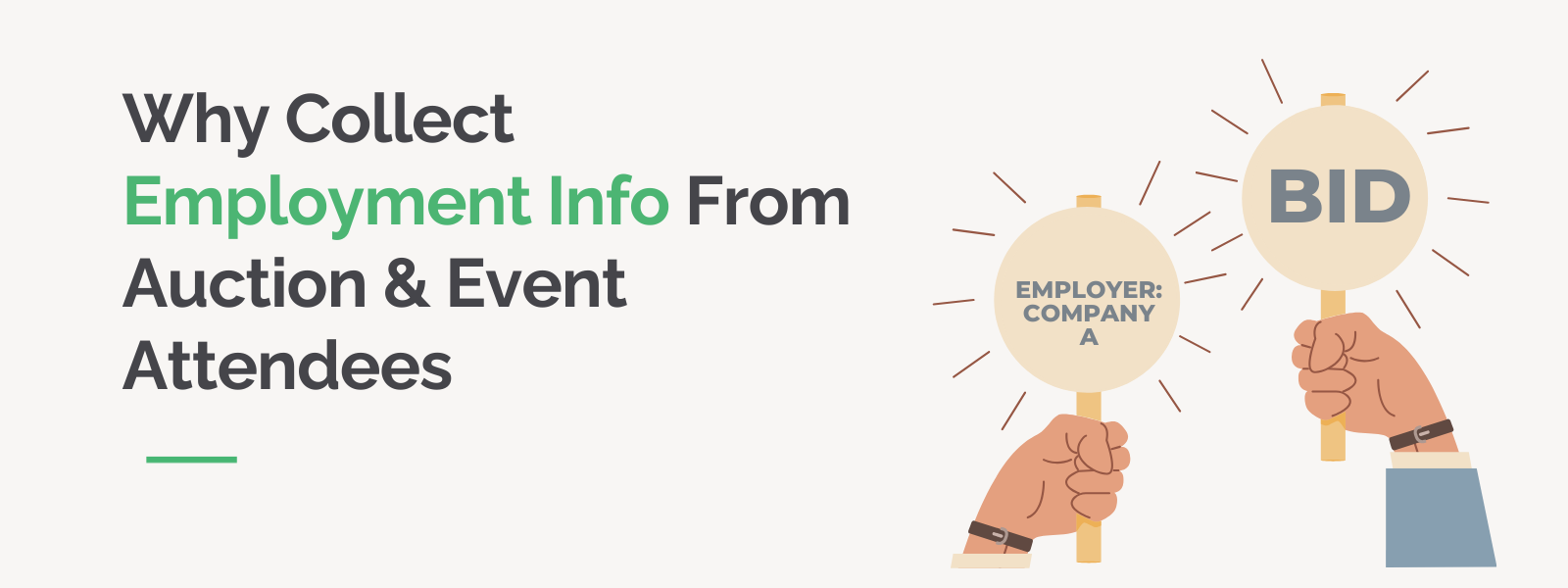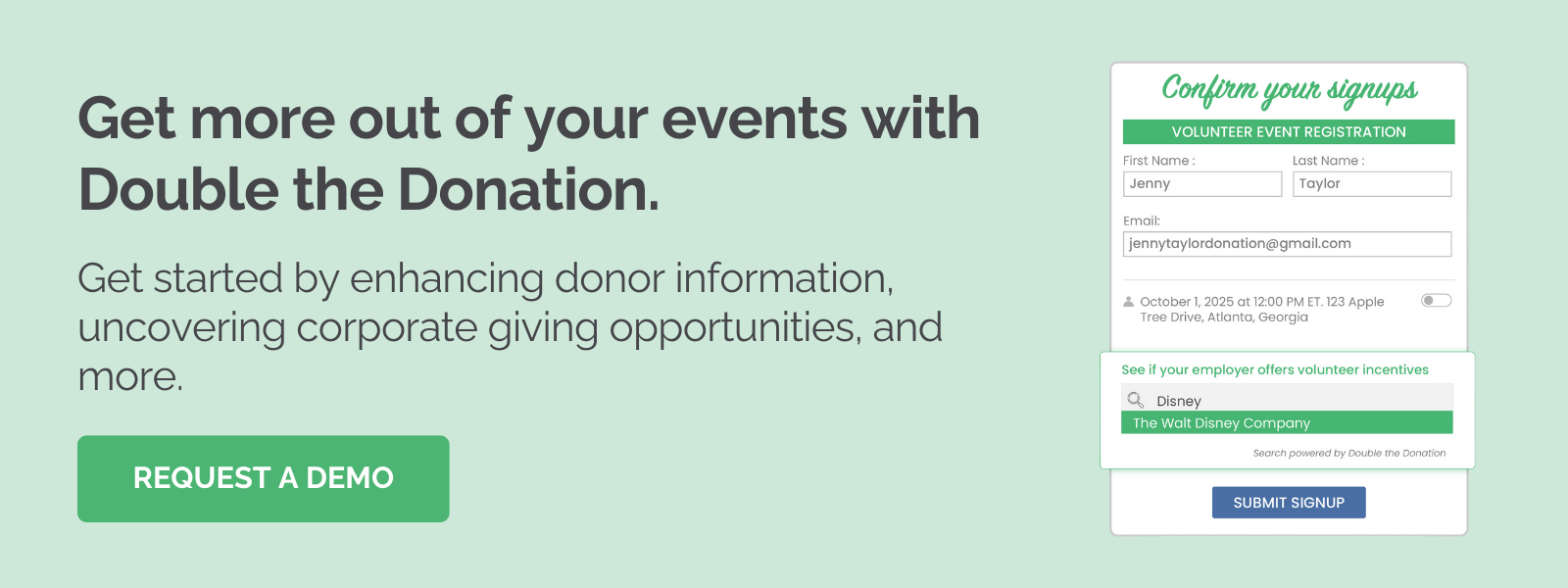Why Collect Employment Info From Auction & Event Attendees
When planning an upcoming fundraising event or auction, nonprofits often focus on the big picture. Ticket sales, sponsorships, and donor engagement. However, one powerful data point is often overlooked: and that is collecting employment info from auction attendees.
Knowing where your attendees work can unlock a host of strategic benefits, from identifying potential corporate sponsors to qualifying for workplace giving programs. In a world where relationships drive philanthropy, collecting employment data at events is more than just a nice-to-have. It’s a strategic move that can directly impact your organization’s fundraising success. And we’ll show you how.
Table of Contents
- Why collect employment info from auction & event attendees
- What to do with the information once you’ve gathered it
- Best practices for collecting employment information effectively
In this post, we’ll explore why collecting employment information is so valuable, how your organization can put it to good use, and the best ways to gather it without disrupting the event experience.
Whether you’re new to this tactic or looking to refine your approach, these insights will help you make the most of every attendee connection. Let’s dive in!
Why collect employment info from auction & event attendees
Collecting employment information at your nonprofit’s events might seem like a small detail, but it can have a significant impact on your overall results.
Here are three compelling reasons to make it part of your event strategy.
As Julia from Double the Donation explains, “Collecting employment data at an event is the single greatest opportunity to maximize the revenue potential of a single attendee. A person who spends $200 on a ticket or an auction item is a generous donor; but knowing their employer allows you to transform that initial $200 into a $400 gift via a corporate match, or even secure a $5,000 corporate sponsorship for next year, simply by finding an internal advocate.”
Employment information allows you to…
Uncover workplace giving opportunities.
Many companies offer workplace giving programs, including donation matching and volunteer grants. By knowing where your attendees work, you can identify which donors might be eligible for these programs. This opens the door to doubling—or even tripling—the impact of a single gift.
Without employment info, these opportunities are often missed entirely.
Tailor your communications.
Employment data helps you send more relevant and personalized messages. For example, if you know someone works for a company with a history of corporate social responsibility, you can highlight sponsorship opportunities or invite them to a company-focused volunteer day.
Personalized communication increases engagement and shows donors that you understand and value their unique connections.
Estimate wealth level.
While job titles and employers don’t provide a complete financial picture, they can offer some helpful context. Employment information can help you identify major gift prospects or prioritize follow-up with attendees who may have greater capacity to give.
Combined with other data points, this insight supports smarter donor segmentation and stewardship planning.
Source in-kind gifts and grants.
Your event and auction attendees are more than just guests—they’re a potential gateway to untapped corporate support. By collecting employment information during the event registration, check-in, or bidding processes, your organization can open the door to new in-kind gifts and grant opportunities from their employers.
After all, many companies offer employee-directed giving programs, including product donations, sponsorships, and community grants. However, these resources often go unnoticed unless someone within the company, like your supporter, makes the connection. And you won’t see those connections if you lack employment data!
What to do with the information once you’ve gathered it
Collecting employment information from attendees is just the first step—the real value comes from how you use it.
Here are five strategic ways to put that data to work for your nonprofit:
Remind donors about matching gift opportunities.
Once you know where your attendees work, you can proactively follow up with tailored reminders about matching gift programs. Many donors are unaware that their employers will match charitable contributions, sometimes dollar for dollar.
A quick email or mention in a thank-you message can encourage donors to take advantage of this benefit, doubling their impact at no additional cost to them.
Encourage volunteers to look into volunteer incentives.
Some companies offer financial donations in exchange for employee volunteer hours, often called “volunteer grants.” If an attendee volunteers or expresses interest in doing so, you can follow up with information about their employer’s program and how to get started.
It’s a win-win: more volunteer engagement and additional funds for your mission.
Leverage employee connections for warm introductions.
Employment data can help you identify potential inroads to corporate sponsors, grantmakers, or CSR teams. If someone at your event works for a company you’re targeting, consider asking them for a warm introduction or insight into the organization’s giving priorities.
Personal connections often open doors that cold outreach cannot, allowing your team to get that extra step ahead.
As Julia from Double the Donation adds, “Cold outreach to a company’s CSR department has a low success rate. But when you have a warm introduction from an employee who just attended your event and is passionate about your cause—an employee identified via your collected data—the conversation completely shifts. That data point is not just a job title; it’s a direct, pre-qualified path to securing major corporate support, from in-kind gifts to high-value event sponsorships.”
Even better: many companies already offer in-kind donations, sponsorships, or community grants through open applications—they’re just not widely advertised. Having an employee advocate within the company can help you discover and navigate these programs, or even prompt the company to consider supporting your organization if a formal program isn’t already in place.
Empower supporters to advocate for deeper partnerships.
Your attendees can be your best advocates. If you know where someone works, you can equip them with talking points or materials to introduce your nonprofit to their employer.
Whether it’s sponsorship, employee engagement, in-kind donations, or event partnerships, an insider can help you cut through red tape and get your foot directly in the door.
Identify key corporate decision-makers.
Some of your event attendees may already be decision-makers at their companies! Fortunately, employment information, especially job titles, can help you identify who holds influence within a business. An attendee who works in HR, community relations, or a leadership role might be a direct path to partnership discussions.
By segmenting your contacts based on their roles, you can prioritize outreach where it’s most likely to yield results.
Best practices for collecting employment information effectively
To make the most of your employment data, it’s important to gather it in a way that’s seamless, respectful, and strategic. Here are four best practices to help you collect this valuable information without disrupting the supporter experience:
Solicit company information as attendees register.
The event registration process is a natural point to ask for employment details. Include a simple, optional field such as “Employer Name” on your sign-up form. Since attendees are already sharing information like names and email addresses, this extra step feels easy and unobtrusive, especially when positioned as part of the standard registration flow.
Add an optional employment field on all donation forms.
Many event attendees will choose to give above and beyond any base registration fees or ticket costs. Since that’s the case, it’s a good idea to collect employment information on your donation forms as well.
This ensures you capture employment info from supporters year-round, too, not just during special events.
Send follow-up reminders to collect employment info.
Not everyone will fill out every field during registration or giving, so it’s important that you follow up. A post-event thank-you email is a great time to ask supporters to share their employer for matching gift eligibility or volunteer grant potential. You can even include a direct link to their request form to make it easy!
Explain the value behind the ask.
People are more likely to share personal information when they understand why it matters—such as to help you uncover the supporter’s eligibility for a giving program. For the best results, include a short explanation near the employment question or in your follow-up messaging.
For example, a blurb like this: “Many companies offer workplace giving programs that could amplify your impact at no additional cost. Let us know where you work and we can find out if you’re eligible for matching gifts and more!” helps build trust and encourages honest responses.
Frequently Asked Questions (FAQ)
1. Why should nonprofits collect employment information from auction and event attendees?
Collecting employment information allows nonprofits to identify attendees who work for companies offering matching gifts, volunteer grants, or broader corporate-giving opportunities. When captured early, during ticket purchase or event registration, this data equips teams to activate employer-related revenue immediately after the event.
2. How can collecting employment information enhance corporate-giving revenue after an auction or fundraising event?
Employment data helps nonprofits segment attendees, identify match-eligible donors, and pursue corporate partnerships linked to attendee employers. By connecting post-event giving activity with known employer programs, organizations can double donations, qualify for volunteer grants, and expand corporate relationships sparked by the event.
3. What are the best ways to collect employment information during auction or event registration?
Nonprofits can add an optional employer field, embed an employer-search tool, or integrate auto-complete technology to streamline data capture. Placing the field on ticketing forms, RSVP pages, or mobile bidding systems ensures higher completion rates while minimizing friction for supporters.
4. What is the difference between asking supporters for employer information and using employer appends?
Asking directly captures self-reported details at the source, usually ensuring higher accuracy, but only if supporters choose to provide it. Employer appends fill the gaps using third-party data (name, address, phone, education, etc.) to infer the supporter’s employer when information is missing or outdated. Each method serves a different role in building a complete employment dataset.
5. When should nonprofits rely on employer appends instead of direct collection?
Appends are valuable when organizations have large volumes of missing employment data, need to enrich historical donor records, or want to identify corporate-giving opportunities in advance of major campaigns. They provide coverage at scale, enabling nonprofits to uncover match-eligible supporters and new corporate prospects even when direct responses are low.
Wrapping up & additional event-planning resources
Collecting employment information from event attendees can open doors to corporate partnerships, matching gift opportunities, and a deeper understanding of your supporter base. By integrating employment info collection into your event check-in or registration process, you lay the groundwork for smarter fundraising and more meaningful engagement.
In today’s competitive nonprofit landscape, every advantage counts—and employment data might just be your secret weapon.
Ready to learn more about corporate giving, employment information, and nonprofit events? Check out these recommended resources:
- Enhancing a Donor Profile With Employment Data [A Guide]. Discover how adding employment information to your donor profiles can help your nonprofit unlock new giving opportunities, identify corporate connections, and build stronger relationships.
- Event Registration Tools | 9+ Solutions for Smart Planners. Explore several top-rated event registration platforms that can streamline your event planning, improve the attendee experience, and make it easier to collect essential data.
- 20 Auction Items for Nonprofits: Ideas for Engaging Events. Need inspiration for your next fundraising auction? Check out these twenty creative and crowd-pleasing auction item ideas that can boost participation and drive revenue for your cause.






